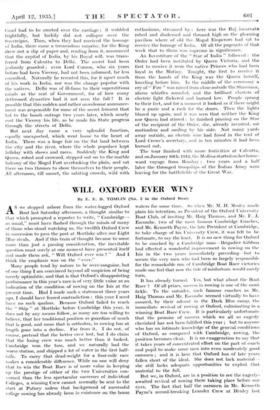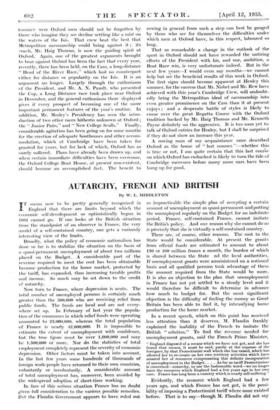WILL OXFORD EVER WIN ?
By E. E. D. TOMLIN (No. 3 In the Oxford Boat)
AS we stepped ashore from the water-logged Oxford Boat last Saturday afternoon, a thought similar to that which prompted a reporter to write, " Cambridge— as usual," must have flashed through the minds of many of those who stood watching us, the twelfth Oxford Crew in succession to pass the post at Mortlake after our Light Blue rivals. And if this train of thought became to some more than just a passing consideration, the inevitable question must surely at one moment have presented itself and made them ask, " Will Oxford ever win ? " And I think the emphasis was on the " ever."
Many people tend by nature to be over-sanguine, but of one thing I am convinced beyond all suspicion of being merely optimistic, and that is that Oxford's disappointing performance in this year's race is of very little value as an indication of the condition of rowing on the Isis at the present time. Had I made such a statement three years ago, I should have feared contradiction : this year I need have no such qualms. Because Oxford failed to reach the " Ship " at Mortlake before Cambridge this year, it does not by any means follow, as many are too willing to believe; that her traditional position as guardian of much that is good, and more that is orthodox, in rowing has at length gone into a decline. Far from it. I do not, of course, pretend that the better crew lost, but I do claim 1 hat the losing crew was much better than it looked. Cambridge won the toss, and we naturally had the worse station, and shipped a lot of water in the first half- mile. To carry that dead-weight for a four-mile race makes a considerable difference. While no one will deny that to win the Boat Race is of more value in keeping up the prestige of either of the two Universities con- cerned than the less spectacular successes of individual Colleges, a winning Crew cannot normally be sent to the start at Putney unless that background of successful college rowing has already been in existence on the home waters for some time. So when Mr. M. II. Mosley made plain his intention, as President of the Oxford University Boat Club, of inviting Mr. Haig Thomas, and Mr. F. J. Escombe, two of the most famous Cambridge Coaches, and Mr. Kenneth Payne, the late President at Cambridge, to take charge of his University Crew, it was felt to be. fortunate, to say the least, It is no new thing for Oxford to be coached by a Cambridge man—Brigadier Gibbon had effected a wonderful improvement in rowing on the Isis in the two years immediately preceding—but to secure the very men who had been so largely responsible for the remarkable run of Cambridge Boat Race victories made one feel that now the tide of misfortune would surely turn.
It has already turned. Yes, but what about the Boat Race ? Of all prizes, success in rowing is one of the most fickle. To the outsider, such famous coaches as Mr. Haig Thomas and Mr. Escombe seemed virtually to have assured, by their advent in the Dark Blue camp, the immediate revival of rowing at Oxford, culminating in a. winning Boat Race Crew. It is particularly unfortunate that the promise of success which we all so eagerly cherished has not been fulfilled this year ; but to anyone who has an intimate knowledge of the general conditions of Oxford, as compared with Cambridge, rowing, the position becomes clear. It is no exaggeration to say that it takes. years of concentrated effort on the part of coach and pupil to make some men into even moderately good oarsmen ; and it is here that Oxford has of late years fallen short of the ideal. She does not lack material she still lacks adequate opportunities to exploit that material to the full.
But we, in Oxford, are in a position to see the eagerly- awaited revival of rowing there taking place before our eyes. The fact that half the oarsmen in Mr. Kenneth Payne's record-breaking Leander Crew at Henley last summer were Oxford men should not be forgotten by those who imagine they see decline settling like a mist on the waters of the Isis. That crew beat the best that Metropolitan oarsmanship could bring against it ; its coach, Mr. Haig Thomas, is now the guiding spirit at Oxford. Again, one of the greatest arguments brought to bear against Oxford has been the fact that every year, recently, there has been held, on the Cam, a long-distance " Head of the River Race," which had no counterpart either for distance or popularity on the Isis. It is an argument no longer. Largely through the enthusiasm of the President, and Mr. A. N. Pazolt, who presented the Cup, a Long Distance race took place near Oxford in December, and the general enthusiasm there displayed gives it every prospect of becoming one of the more important permanent features of the year's routine. In addition, Mr. Mosley's Presidency has seen the intro- duction of two other races hitherto unknown at Oxford ; the " Junior Pairs," and " New College Sculls." Finally, considerahle.agitation has been going on for some months for the erection of adequate boathouses and other accom- modation, which at Cambridge have been taken for granted for years, but for lack of which, Oxford has as surely suffered. Plans have already been drawn up, and when certain immediate difficulties have been overcome, the Oxford College Boat House, at present non-existent, should become an accomplished fact. The benefit to rowing in general from such a step can best be gauged by those who see for themselves the difficulties under which men at Oxford have, in this respect, laboured so long.
That so remarkable a change in the outlook of the sport in Oxford should not have rewarded the untiring efforts of the President with his, and our, ambition, a Boat Race win, is very unfortunate indeed. But in the next few years—I would even say months—we cannot help but see the beneficial results of this work in Oxford. The first signs should become apparent at Henley this summer, for the success that Mr. Nisbet and Mr. Rew have achieved with this year's Cambridge Crew, will undoubt- edly . bring the Metropolitan ideal of oarsmanship into even greater prominence on the Cam than it at present enjoys ; and a desperate battle of styles is likely to ensue over the great Regatta Course with the Oxford tradition backed by Mr. Haig Thomas • and Mr. Kenneth Payne definitely on the aggressive. It is too soon yet to talk of Oxford entries for Henley, but I shall be surprised if they do not show an increase this year.
A rowing man of my acquaintance once described Oxford as the home of " last courses "—whether this is true or not, I am quite certain that this last course on which Oxford has embarked is likely to turn the tide of Cambridge successes before many more oars have been hung up for good.



















































 Previous page
Previous page